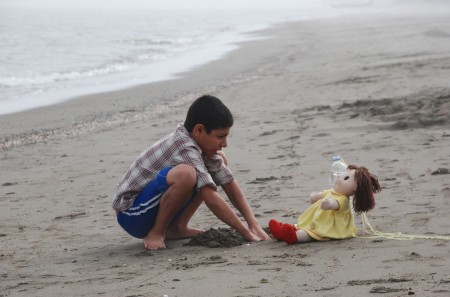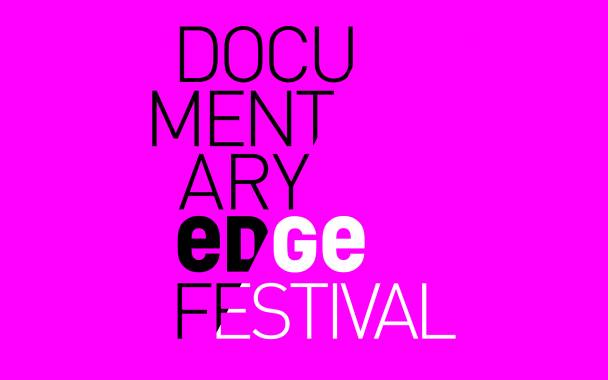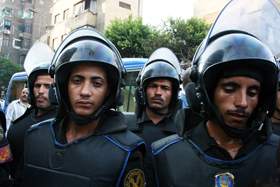Arab Spring: Lifting The Veil
New Zealand and the world watched in amazement as a revolutionary wave of demonstrations and protests known as the ‘Arab Spring’ took place. This year, The Documentary Edge Festival 2012 pays tribute to these defining moments in recent history.
New Zealand and the world watched in amazement as a revolutionary wave of demonstrations and protests known as the ‘Arab Spring’, swept throughout Tunisia, Egypt, Libya to Yemen in late 2010. Civil uprisings forced the rulers of these four countries out of power, while protests took place in Bahrain, Syria, Algeria, Iraq, Jordan, Kuwait, Morocco, Oman, Lebanon, Sudan... the list goes on. With the selection of films entitled Arab Spring: Lifting the Veil, The Documentary Edge Festival 2012 pays tribute to these defining moments in recent history.
For session times and to book, visit: www.docnz.org.nz
Tahrir 2011: The Good, the Bad and the Politician
On January 25th 2011, Egyptians woke up to a public holiday that would turn into a revolution overthrowing Egypt’s political regime. For 18 days, the world watched as Egyptians called for an end to injustice, poverty, and corruption. Tahrir 2011: The Good, the Bad and the Politician chronicles the lives of the protesters and the police forces as well as profiling former president Hosni Mubarak. Combining interviews with footage from the demonstrations, Tahrir 2011 debunks the misconceptions and stereotypes that have risen from this important day in Egypt’s history.
Forbidden
Egyptian director Amal Ramsis' starting point for her documentary is a question with far-reaching implications; what isn't forbidden in Egypt? Forbidden provides a snapshot of the final days of the fallen regime and reveals through discussions with Ramsis' friends how difficult and even absurd life is for ordinary citizens under Mubarak. Rules govern filming on the street, where to walk, who to mix with, where you can go and what you can buy. This documentary realistically depicts the climax of events and repressions that led to the massive uprising, giving a clear understanding of how every aspect of Egyptian society has been oppressed.
A Balloon for Allah
When the Norwegian-Turkish filmmaker Nefise Özkal Lorentzen was little, she used to send letters to Allah by balloon. Now she wants to send a new balloon to challenge the role of women in Muslim culture. A Balloon for Allah shifts between documenting her journey to rediscover the Islam of her grandmother to charting the dreams Nefise holds for the future. She interviews both extremist and liberal Muslims, drinking tea with the Egyptian feminist Nawal El Saadawifinds and meeting the 90-year-old author Gamal al-Banna, who has received several death threats for his liberal interpretation of Islam. Perhaps most interesting from a Western perspective, she also talks to a fundamentalist Muslim whose wife has never been alone outside during their six years of marriage.

The Last Days of Winter
In The Last Days of Winter, director Mehrdad Oskouei follows the lives of seven teenage boys; inmates in a children's correctional unit. Set ahead of the Iranian New Year, Oskouei gains their trust and confidence. The boys share their thoughts to the camera – including what brought them to the facility as well as their hopes and fears. Forced to grow up too quickly because of their circumstances, they miss their families and are not able to enjoy the simple pleasures of childhood. Oskouei delivers a touching reflection on life and destiny that causes the audience to contemplate what type of reform system would be most appropriate for juveniles.
Malaki - Scent of an Angel
A legacy of Lebanon’s long and bloody civil war (1975-1990), thousands of people remain missing. For over five years, relatives of people reported abducted have been keeping vigil in a tent outside the UN Headquarters in Beirut. This is the story of the mothers and wives of those who have vanished, who refuse to forget them and continue to campaign to uncover their fate. Original and creative, disturbing and heart-wrenching, Malaki - Scent of an Angel sheds light on the trauma of six different families affected by the war.
Teta, Alf Marra (Grandmother, A Thousand Times)
Teta, Alf Marra (Grandmother, A Thousand Times) is a cinematic love letter to Teta Fatima, a feisty Beiruti grandmother. Forced to cope with the silence of her once bustling household, she remembers her beloved husband and imagines what awaits her beyond this life. Director Mahmoud Kaabour's documentary, which commemorates his grandmother’s many worlds, screens with Arabic Fusion: The Sound Between the Notes, a musical exploration of contemporary Arabic music.






